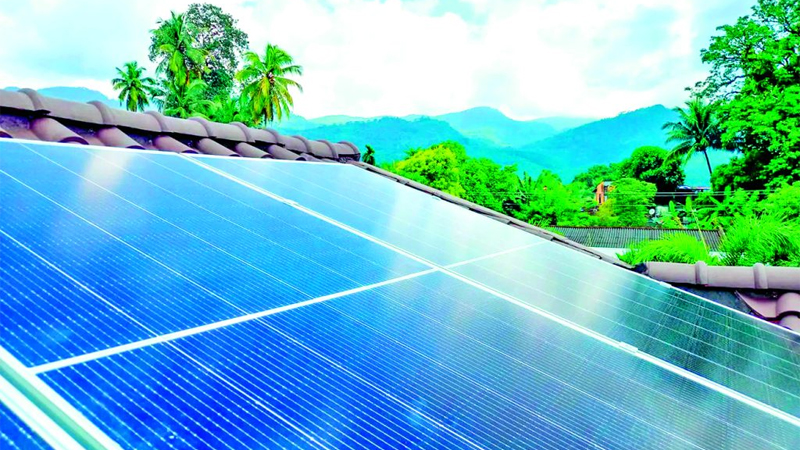For years, rooftop solar has been a cornerstone of the country’s renewable transition, particularly through progressive schemes such as Net Plus Plus (Net++), which enabled commercial and industrial customers to install systems beyond their own consumption and export all generated electricity to the Grid. Large rooftops, such as those of warehouses and factories, have played a vital role in this transition.
However, recent policy decisions are now threatening to undermine this progress.
The authorities are rolling back key enablers of this success. The Sunday Observer Business sought the views of the Chairman, Sri Lanka Sustainable Energy Authority, Prof. T.M.W.J. Bandara on this.
He said the Government firmly sticks to its vision of reaching 70 percent energy generation from renewable energy sources, slashing electricity prices by 30% by 2030 and achieving net zero carbon emission by 2050.
“Solar, wind, hydro and biomass will not only be environment-friendly but save a large amount of foreign exchange going out from the country to purchase costly and toxic fuel. So there is no two words about undermining renewable energy for any reason,” Prof. Bandara said.
However, he said there could be hiccups here and there when new technology is introduced but that does not mean they will be brushed aside.
“We have the issue of over-supply of solar energy to the grid on Sundays which is comparatively a less energy used day as most factories are closed. However, there are solutions to this. Energy could be stored in batteries and built pumps that will help get over the supply-demand equation soon,” Prof. Bandara said adding that the tariff for units generated was reduced due to the rupee against the US dollar stabilising that brought down the cost of solar panels.
However, he said that he is for offering a higher price for units generated through solar energy.
In a move that has shocked the industry; new regulations prohibit Net++ customers from installing systems beyond their contracted demand. The previously investor-friendly variable tariff mechanism, designed to hedge against currency fluctuations and interest rate volatility, has been discontinued. This removes a crucial safeguard that protected both foreign and local investors from financial risk.
Developers are also reeling from a sudden, unexplained drop in the Feed-in Tariff (FIT), from Rs. 42/kWh to Rs. 27/kWh — introduced without stakeholder consultation or transparency around the assumptions used. Multiple FDI-backed projects have since been paused indefinitely, and further tariff reductions are reportedly underway, worsening the investment climate.
While the country has long championed a shift to sustainable power, committing to a 70% renewable energy target by 2030, recent policy reversals and regulatory uncertainties are threatening to derail this vision.
As of 2024, Sri Lanka’s national grid operates at an average cost of Rs. 26.77 per unit of electricity (kWh) at the selling point—excluding hidden costs such as Treasury support and capacity charges. Despite public commitments to clean energy, fossil fuels continue to dominate the energy mix: coal accounts for 36% and oil 17% of total generation, meaning over half of the country’s electricity still comes from expensive and polluting sources.
In contrast, solar energy — comprising 7% of the mix — remains one of the cheapest and cleanest options available, second only to large-scale hydropower.
Hurdles on the way will derail efforts to create a greener energy future looked forward to by the renewable energy sector and all energy-conscious citizens.
To make matters worse, the Ministry of Energy recently published a retrospective revision of rooftop solar tariffs, affecting payments made during Q1 through Q3 of 2024. The CEB and the Ministry have failed to perform their basic duties by not publishing tariffs on a quarterly basis and in a bid to cover their inefficiencies they published traffic rates after nine months in October 2024 related to Q1 to Q3.
The CEB is now seeking to reclaim these payments—labeling them as “overpayments.” This move has deeply unsettled developers, as retroactive changes not only threaten their financial stability but also severely undermine trust in regulatory consistency and the sanctity of previously agreed contracts.
The nationwide blackout on March 9, 2024, not only disrupted power supply but also exposed critical weaknesses in infrastructure planning and policy responsiveness.
Rather than addressing systemic issues, some officials have shifted the blame onto renewable energy. To make matters worse, large-scale solar and mini-hydro plants have been subject to sudden curtailment requests — particularly on sunny Sundays —often communicated informally and without official notice. These unplanned interruptions further reduce clean energy output and undermine investor-confidence, falsely portraying renewables as the root cause of instability rather than part of the solution.
Had timely decisions been made to strengthen grid infrastructure, including better integration and flexibility, the situation could have been mitigated—potentially lowering generation costs even further. Yet, decision-making remains sluggish, worsening the situation despite readily available solutions such as large-scale Battery Energy Storage Systems (BESS).
The consequences of these policy shifts reach far beyond the energy sector. Without stable and supportive policies, Sri Lanka may be forced to increase its reliance on imported fossil fuels, placing additional pressure on foreign reserves and widening the trade deficit.
The renewable energy sector has become a vital source of employment, particularly in solar installation, engineering, and maintenance. A slowdown in project development could lead to widespread job losses, affecting not only the energy industry but also adjacent sectors such as manufacturing and logistics.
Sri Lanka stands at a pivotal crossroads. The groundwork for a cleaner, more sustainable energy future has already been laid—but that progress is now at risk. The renewable energy sector and the communities it empowers, urgently need stable, transparent and investor-friendly policies.









